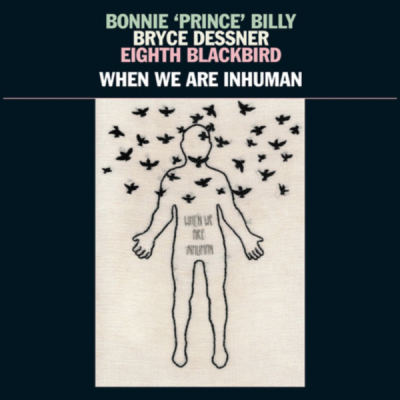How many times can one musician revisit songs before abandoning them?
For Will Oldham, the answer might sound something like, "Never. The songs will tell you when they’re ready." That's because Oldham is a songwriter just as much as he is a reviser of songs long past.
Oldham's not limited to his songs, either. A short trip through his catalog reveals that he isn’t afraid to dedicate entire albums to other people's songs (Wolf of the Cosmos, Best Troubadour) or to even revisit previous eras to inject them with new blood.
When We Are Inhuman falls squarely in the middle of revisitation and decontextualization. It's a collaborative album between Bonnie 'Prince' Billy, Bryce Dessner, and Eighth Blackbird, a contemporary classical sextet. The record is steeped in classical, symphonic instruments (violin, cello, piano, and woodwinds) and shares plenty of indie-laced DNA with new(ish) classical groups such as Kronos Quartet and composers Nico Muhly and Nils Frahm.
Eighth Blackbird are keen at subverting expectations of what classical music should be, as they walk that fine line between classical composition and the indie mindset. It’s a hard sell for unfamiliar and unadventurous listeners, but Dessner and Oldham’s names give the record some leverage with non-classical audiences. I’m not sure I would have picked it up based on the strength of Dessner and Eighth Blackbird alone, which means—to the album’s benefit—the record relies heavily on Oldham’s songs and his unmistakable voice.
“New Partner,” “Beast for Thee,” “One With the Birds,” and “When Thy Song” are the four Oldham tunes that made the record, each one steeped in the folk/traditional style of Appalachian music—a style Oldham has staked much of his work to—and reworked for piano by Lisa Kaplan. The addition of Dessner and the Eighth Blackbird sextet create a new, open space inside each of these songs, one that wasn’t always there.
Spartan songs in origin, the wooden space and the silence between the finely tuned strings and the hearty words give each a dual sense of melancholy and uplift. Oldham’s voice has rarely been as forceful and rich as it is on “One With the Birds” and “New Partner.” Never one to follow the trail on a vocal melody for too long, he captures the core of each track by gliding and slipping around to different registers, but he also holds fast to the roots of these songs.
On his compositions Oldham feels comfortable playing around. He pushes certain words in and out of range of the microphone. Doing so gives each new listens a different focal point, a different syllable, and a different aural connection each go 'round.
“New Partner” is, to me, a quintessential Bonnie song. It’s the song I direct people to who might be looking to enter into his kingdom. It’s about as good an entrance as you can get to his enormous catalog—an acoustic ballad that uses his natural cadence and a soft melody to highlight guitar strums and sweet, sweaty imagery. Yet here, Oldham flexes his emotional muscles in the words within the verses. He transforms something simple into a complex ballad. In the song, there’s the presence of benign beasts, the “loons on the moor / the fish in the flow” and the sweet and lurid reference to human sexuality that nabs me every time I hear it: “a skirt in the bedroom that’s pleasantly low” and “rest your head on my thighs.”
Like all other times, “New Partner” is the stand out track on the album. But traditional folk covers of “Banks of Red Roses” and “Down In the Willow Garden” are as eerily potent and compelling to listen to next to his songs. So much of folk music is one gruesome, bloody tale of American love ending unusually violent death. With this as the source material for much of country music, it's no wonder that listeners lament the anesthetizing of songs by modern country music players.
Even the title of the record, When We Are Inhuman, is there to remind us that we’re never too far removed from the animal kingdom and its lizard-brain, evolutionary drive. It’s a theme that Oldham returns to again and again in his music: work, sex, animals, beasts, and natural beauty. But it seems to be in specific focus on When We Are Inhuman. Which pairs nicely with a classical sextet trilling and plinking in and around the songs.
Dessner's movements from Murder Ballads—another collaboration with Eighth Blackbird—show up here, too. They pad the record as palette cleansers between the lush folk tracks but also merit repeated listening. When We Are Inhuman doesn't need another murder ballad movement, but it elevates the whole experience more than a few notches.
Fittingly, the record ends with the near-16 minute version of Julius Eastman's “Stay On It,” a jovial, jubilant, skyscraper of a crescendo that builds on a staccato line and unfolds out to include what sounds like a literal kitchen sink. Bells, whistles, whoops and hollers mingle as voices yell, “Stay on it!” before the records ends with a loose free-for-all that suggests. “Maybe, even if we are inhuman, we can still have fun.” It's a much-needed lift after 40-plus minutes of murder and lust; a fitting conclusion to a fruitful collaboration.


